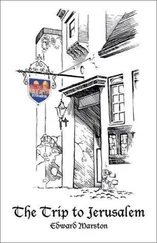The girl was frightened but not incapable of thought. She was ready to jump out the window, but first she wanted to see if she could take advantage of his drunkenness as others had done. In particular she noticed how the drooping left eyelid seemed to confuse his movements.
She therefore praised his magnificent virility. She said she had been waiting weeks for this moment and offered him another flagon of arak, hoping, she said, that this would double the time he spent on top of her. The Wallenstein warrior, laughing hysterically at his own prowess, staggered to his feet and drank off the arak.
His left eye snapped shut. He lunged and smashed into the wall, reeled backward blindly and went crashing through the window, landing on his face in the moat several hundred feet below, instantly dead in his sexual frustration.
The little Armenian girl was put to work in the castle stables until she was ten, old enough not to attract the attention of the next Skanderbeg. When she was fifteen she began to sneak down into the villages at night, determined to find an Armenian who could father a child for her and thereby keep alive her Armenian heritage in the barbaric foreign land where fate had brought her. Before long an itinerant Armenian rug dealer chanced to pass through the district and was happy to oblige her. A girl was born and fifteen years later another itinerant Armenian rug dealer spent a pleasurable week with another young Armenian woman in one of the villages.
Thus these mothers and daughters, while cleaning the Wallenstein stables, maintained their pure Armenian blood down to the middle of the nineteenth century, when Sophia broke the tradition by becoming the common-law wife of the last of the Skanderbegs, the forger of the Sinai Bible.
In 1909 Sophia ended her period of formal mourning and emerged from seclusion in the castle.
Agriculture no longer interested her so she turned her attention to the problems of energy, opening several low-quality lignite mines on her estate. Then when the British navy switched from coal to oil in 1911, Sophia decided she should go to Constantinople and learn what little was known about oil in the Middle East. She studied diligently there and became convinced that oil could be found along the Tigris.
In 1914 she executed the second most brilliant maneuver of her career by putting together a syndicate, in Constantinople, of English oil companies and German banks to exploit the oil along the Tigris, obtaining a charter from the Ottoman government for that purpose.
As broker of the agreement, Sophia retained for herself a share of seven per cent of all future profits.
Because of the war the syndicate was inactive for the next five years. Then in 1919 Sophia convened the highly secret meeting of its members.
The English responded eagerly and so did the French, new partners in the syndicate, Sophia having cleverly transferred to them the shares formerly owned by the defeated Germans. England and France now administered the Middle East through various mandates. And the oil companies of the two countries, at her insistence, had successfully persuaded their governments that the syndicate's charter should apply not just to the Tigris valley, but to all the lands that had previously been a part of the Ottoman Empire.
The meeting was to be held on a barge in the middle of Lake Shkodër, on the Albanian-Yugoslav border, thereby allowing members to approach the meeting from different countries for added diplomatic security. Sophia herself spent the night before the meeting in the city of Shkodër.
So as not to arouse suspicion by her presence in the city, she had arranged to dine with the archbishop and formally announce her endowment of a chair of moral metaphysics at the Jesuit college there. But she retired from the banquet early, telling the archbishop that her kidney stones were bothering her.
Well before dawn a fishing boat, with rags tied around its oars, was carrying Sophia across the dark lake toward the barge.
The barge had formerly been used to transport lemons from the lake down to the Adriatic. Its old worn planks were deeply impregnated with a rich lemon smell, and in fact Sophia had sentimentally chosen the barge for that very reason.
For nearly seventy years she had treasured the smell of lemons above all others, ever since that distant afternoon in her youth when she and her Skanderbeg had wandered hand in hand through the lemon groves beneath his castle, smiling and laughing and finally sinking into the grass to become lovers, both of them knowing another for the first time in the heady perfume of that blossoming Mediterranean spring of long ago.
The exterior of the barge had been disguised with earth and bushes and vines to make it look like a small island, but inside it was nothing less than lavishly decorated. Magnificent Oriental rugs and tapestries abounded, giving the chamber an opulent Levantine atmosphere. Instead of a conference table there was a circle of thick satin pillows where the syndicate representatives could lounge comfortably while sipping cups of strong Turkish coffee. The soft flickering light cast by the tapers along the walls, together with the dishes of delicate incense and the sweet all-pervasive smell of lemon trees in bloom, added to the sense of Oriental ease.
Above the circle of pillows a small yet particularly splendid Oriental rug had been cleverly suspended on thin wires, the wires invisible in that dim light, which gave the impression that the rug was a flying carpet from one of the traditional Arab tales of romance. On this Sophia had positioned herself to meet her guests, standing on the flying carpet which had been raised to a height where she could greet the men eye to eye.
The English and French representatives began to arrive, dressed as gentlemen on a fishing holiday, rowed to the barge by Sophia's servants dressed as local fishermen. They presented their credentials to Sophia, who indicated the circle of pillows. When everyone was comfortably stretched out she sat down on her flying carpet and gave a short welcoming speech, emphasizing that the syndicate now owned all the oil reserves in the former Ottoman Empire. She then asked for presentations from the floor.
It was immediately apparent the other members of the syndicate had no idea what the boundaries of the former Ottoman Empire enclosed. Maps were spread out in the middle of the circle and consulted, but none of the maps agreed with one another. The extent of the former Ottoman Empire was utterly confused by its long history of decay.
An hour passed. The English representatives were still mumbling repetitiously, the French still jabbering passionately, but nothing had been jointly discerned. Throughout this time Sophia had remained absolutely silent, sitting on her flying carpet overhead, chain-smoking cheroots and watching the proceedings. At the end of an hour, however, she apparently said something in Tosk or Gheg to her servants, because the flying carpet suddenly began to move.
Everyone in the room stopped talking. The men lounging on the pillows watched in wonder as the flying carpet slowly descended into the middle of the circle, coming to rest a few inches above the floor, Sophia sitting rigidly in her flat black hat and her black gloves, her thin black veil with the cheroot sticking through it. They could now see she was holding something in her left hand, what looked like an exquisite porcelain cup.
Sophia raised the cup in front of her and leaned out over the edge of the flying carpet. She studied the large map laid out on the floor and dipped her right forefinger into the cup. She touched the map.
The men gasped. A heavy black viscous substance spread where her finger had been. Pure crude.
Sophia nodded to herself and blew a smoke ring in the air. She had touched Constantinople, obliterating it with oil. Now the flying carpet moved gracefully around the circle, still hovering inches above the floor, and the steady black line traced by Sophia's finger began to lengthen.
Читать дальше












